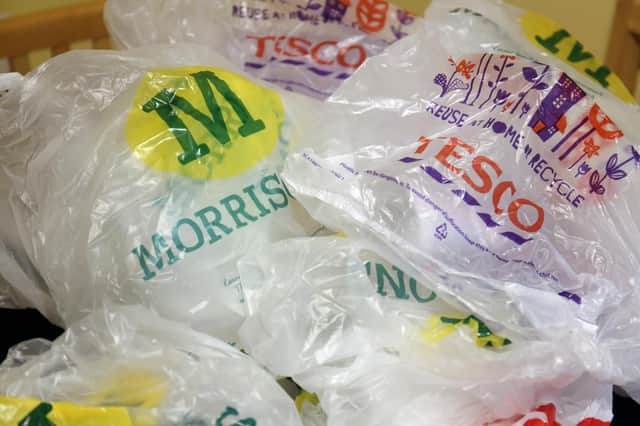UK supermarkets creating plastic waste 'equivalent to 90 Eiffel Towers'


The third annual plastics survey conducted by Greenpeace UK and the Environmental Investigation Agency said the chains are “treading water” in terms of reducing plastic waste after they cut plastic by just 1.6 per cent in 2019.
The figure was a 1.2 per cent increase compared to 2017 when the survey was first conducted and they produced a total of 886,021 tonnes of plastic.
Advertisement
Hide AdAdvertisement
Hide AdChecking Out on Plastics III ranks the ten supermarkets in terms of their efforts to reduce plastic pollution and this year’s scorecard shows Waitrose at the top for the second consecutive year, with Iceland in tenth place.
Of the five largest UK supermarkets by market share, Aldi ranked first, followed by Sainsbury's, Tesco, Asda and Morrisons.
EIA senior campaigner Christina Dixon said: “In our third year of looking at plastic packaging in UK supermarkets, we had hoped to see a much sharper downwards trajectory as strategies and targets bear fruit. Instead, we are looking at a relatively static picture which represents a drop in the ocean of tackling plastic pollution. The sector urgently needs to pick up the pace of plastic reduction.”
The report found more than 1.58 billion plastic ‘bags for life’, which contain more plastic than thinner single-use bags, were issued in 2019 – a 4.5 per cent increase over 2018. This represents almost 57 bags per UK household during the year.
Meanwhile, the number of single-use plastic carrier bags issued fell by 33 per cent and several supermarkets have banned them entirely.
Almost 2.5 billion plastic water bottles were sold or given away in UK supermarkets in 2019.
Although most companies reported reductions on own-brand plastic packaging, the percentage of branded packaging in 2019 rose by 5 per cent compared to 2017.
Ms Dixon said: “Supermarket targets and reduction efforts are primarily focused on own-brand plastic packaging, which makes sense as they have more direct control over the supply chain.
Advertisement
Hide AdAdvertisement
Hide Ad“However, this means that the amount of packaging used for popular branded goods is not reducing and we’d like to see supermarkets increasingly taking the fight to the big manufacturers and compelling them in turn to drive down their own plastic footprints.
"This can be achieved through sourcing policies that reflect packaging reduction requirements and the phasing out of problematic plastics, working with brands to test alternatives and, ultimately, pledges to de-list suppliers which will not comply.”
Sian Sutherland, founder of campaign group A Plastic Planet, said: "Next month is the three-year anniversary of the launch of the world's first plastic-free aisle in Amsterdam.
"The plastic free aisle instantly became a global symbol of hope for shoppers – that it is possible today to buy our groceries without the guilt of indestructible plastic packaging.
"And yet, here we are, three years later with the proof that supermarkets are still giving us far too many plastic pledges and promises and far too little real change that actually tackles the crisis.
“We call today, yet again, for national reduction targets to be set by our government and for mandatory plastic footprint transparency throughout all supermarkets and industry.”
A message from the Editor:Thank you for reading this article. We're more reliant on your support than ever as the shift in consumer habits brought about by Coronavirus impacts our advertisers.
If you haven't already, please consider supporting our trusted, fact-checked journalism by taking out a digital subscription.
Comments
Want to join the conversation? Please or to comment on this article.
